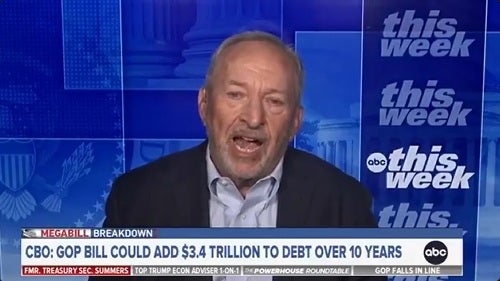Donald Trump got his wish of signing the “big, beautiful bill” into law on July 4, but a top economist is pouring cold water on his celebrations.
Larry Summers, the former Obama Treasury chief and center-left economic guru, unleashed scathing criticism of the law on Sunday, claiming it was going to harm American economic growth by slashing the social safety net in the most unprecedented manner in decades.
“The Yale Budget Lab estimates that it will kill, over 10 years, 100,000 people. That is 2,000 days of death like we've seen in Texas this weekend,” Summers told ABC’s George Stephanopoulos on This Week.
“In my 70 years, I’ve never been as embarrassed for my country on July 4th,” he added.
“These higher interest rates, these cutbacks in subsidies to electricity, these reductions in the availability of housing, the fact that hospitals are going to have to take care of these people and pass on the costs to everybody else, and that's going to mean more inflation, more risk that the Fed has to raise interest rates and run the risk of recession, more stagflation, that's the risk facing every middle-class family in our country because of this bill.
“And for what? A million dollars over 10 years to the top tenth of a percent of our population? Is that the highest priority use of federal money right now? I don't think so. This is a shameful act by our Congress and by our president that is going to set our country back,” Summers continued.

He also rejected out of hand projections from Trump’s White House Council of Economic Advisers, who claimed that economic growth resulting from the tax cuts and other measures in the bill would balance out the bill’s deficit spending. This proved to be a headache for conservatives who fought to make deeper spending cuts in the legislation, but were denied.
“It is, respectfully, nonsense. None of us can forecast what's going to happen to economic growth,” said Summers. “There is no economist anywhere, without a strong political agenda, who is saying that this bill is a positive for the economy. And the overwhelming view is that it is probably going to make the economy worse.”
Summers’s criticism will likely be written off by the administration as coming from a former Obama appointee, but even nonpartisan forecasters continue to fret that any growth of the U.S. economy resulting from tax cuts will likely be offset by the Trump administration’s tariff policies, which are set to go back into effect this Wednesday. A 90-day pause on the president’s so-called “reciprocal” tariffs is due to end, and the president is set to send letters to numerous U.S. trade partners informing them of the new tariff rates.
Negotiations with the EU and various countries are ongoing, but officials have given no indication that another pause is on the table. Markets slid sharply upon the last announcement that the president would be sharply raising tariffs.
Summers is one of many economists who has called the president’s tariff strategy naive.
“The question is mostly how much damage is going to be done,” he said of Trump’s tariffs in April, during a Bloomberg interview, adding that the reciprocal tariffs plan was “bizarre”.
Andy Beshear, the Democratic governor of Kentucky, also trashed Trump’s megabill on Sunday during an interview on CNN’s State of the Union.
The governor of a state with many rural areas, Beshear was a vocal opponent of the bill’s provisions to cut Medicaid and SNAP benefits via the imposition of work requirements, which nonpartisan analysts project will cause millions to leave the programs due to issues with paperwork, government red tape or confusion about reporting requirements.
On Sunday, Beshear delivered vicious criticism of Republicans in Congress who supported the legislation, accusing them of believing “that poor people are stupid” as the GOP attempts to deny that the bill represents a cut to Medicaid. Republican lawmakers, defending the bill’s new work requirements, have repeatedly echoed the same depiction of a Medicaid recipient at risk of losing eligibility under the new law: a young, male twenty-something living unemployed in a basement collecting government benefits, a cartoonish stereotype Democrats say simply doesn’t exist in real life.
“You can lie all you want about what's in this bill. But the numbers are the numbers,” said Beshear on Sunday. “These work requirements aren’t really about getting people back to work. They are about increasing the paperwork on everybody.”

 5 hours ago
4
5 hours ago
4









